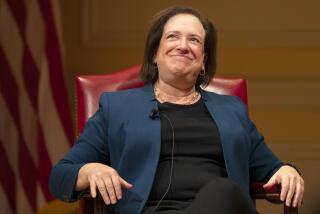Court Ruling May Have Big Effect on Copter Crash Suits
- Share via
A decision by the U.S. Supreme Court earlier this week involving the Sikorsky Aircraft Co. and the Marine Corps CH-53D Sea Stallion helicopter may have a major impact on lawsuits filed against Sikorsky because of military aircraft crashes, lawyers involved in such suits said Wednesday.
The Supreme Court agreed Monday to review the case of Boyle vs. United Technologies Inc., Sikorsky’s parent company, which was filed by the parents of Lt. David Boyle, a 27-year-old Marine who drowned in 1983 when a Sea Stallion crashed into the ocean off Virginia.
The Sea Stallion is the predecessor of the Sikorsky-built CH-53E Super Stallion. It was a Super Stallion helicopter that crashed last Thursday near the Salton Sea in Imperial County, killing five Marines stationed at the Tustin Marine Corps Air Station.
At issue in the Boyle case, the attorneys said, is the fate of the so-called “government contract defense,” which under some circumstances protects private companies from lawsuits in which active-duty personnel die in military accidents.
Federal appeals courts around the country have differed on the exact circumstances under which companies are immune from liability under that defense.
The courts have ruled that the key issue--in a fatal accident caused by an equipment or design malfunction--is whether “reasonably precise specifications for the defective equipment were established by the U.S. government,” which is immune in many cases from lawsuits.
“This case could blow us all out of the water, or cause the defense industry to sit up and take note,” said Thierry P. Colaw, a Santa Ana attorney representing the families of two of 17 crew members who died in the May 6, 1985, crash of a CH-53D Sea Stallion off Okinawa.
“It could definitely have an impact,” said Wylie A. Aitken of Santa Ana, who represents families of men who died in crashes of both the CH-53D and the CH-53E Super Stallion.
Attorneys for United Technologies could not be reached for comment Wednesday.
In a Richmond, Va., federal jury trial, the Boyle family’s attorney, Michael B. Moore of San Francisco, argued that the 1983 crash was the result of “negligent repair of the hydraulic steering system” by Sikorsky, which he said caused the helicopter to drop into the ocean, and “defective design” of an escape hatch by the company, which prevented Boyle from getting out of the aircraft.
Attorneys for United Technologies, who were joined in the defense by a lawyer for the Aerospace Industries Assn., contended that the crash was the result of pilot error, when Boyle and the pilot both attempted to steer the helicopter at the same time during a nighttime exercise involving landings on the deck of an aircraft carrier.
The jury awarded Boyle’s family $750,000 in damages, but when Sikorsky attorneys appealed the ruling, the 4th U.S. Circuit Court of Appeals threw out that award and others from two additional military crashes. Boyle’s attorney appealed to the U.S. Supreme Court, which Monday agreed to hear the case, probably this spring.
“Everybody’s going to be holding their breath,” Colaw said.
More to Read
Inside the business of entertainment
The Wide Shot brings you news, analysis and insights on everything from streaming wars to production — and what it all means for the future.
You may occasionally receive promotional content from the Los Angeles Times.










